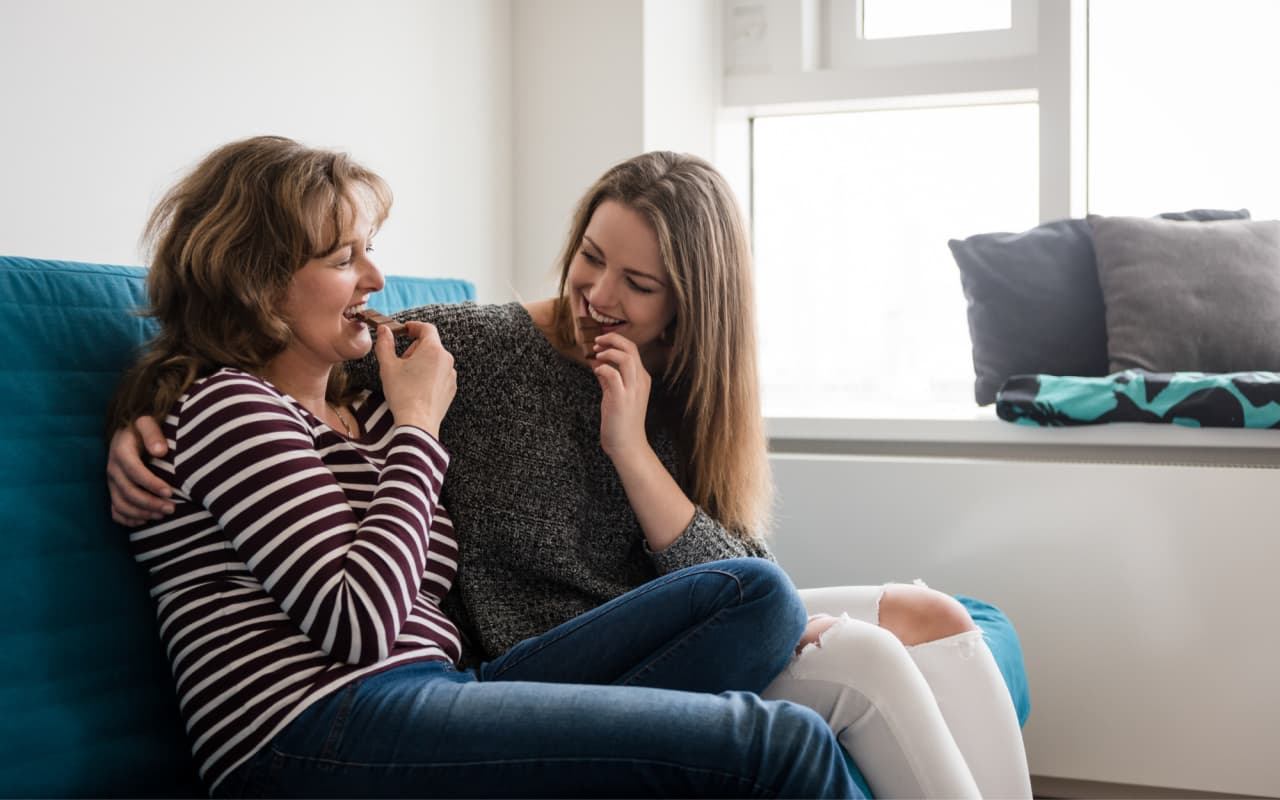Constipation in Older Adults: 9 Tips for Relief

Written by Sophie Bebeau on Wed Nov 02 2022.

Constipation isn’t a fun topic to talk about and is even less fun to experience. But if you're an older adult or the caregiver of an older adult, it's important to get comfortable talking about bowel movements. Constipation is very common in people over age 65, making up for 2.5 million visits to the doctor every year. That means if you or a loved one is constipated, you're not alone!
This article will give you a quick overview of constipation, the signs and symptoms, home remedies to consider, and when to talk to your doctor.
What is constipation?
Simply put, constipation is when you have trouble going number two. But if we're being technical, constipation is when you have fewer than three bowel movements in a week. Constipation may also be diagnosed if you experience two of these symptoms at least 25% of the time you go number two:
Hard, dry, or lumpy stool
The need to strain
Feeling like you haven't completely emptied your bowels
Needing to manually remove stool
What are the symptoms of constipation?
Besides having less than three bowel movements each week and the previously listed signs, other common symptoms of constipation include:
Stomach pain
A feeling of fullness that doesn't go away
Bloating
Vomiting
Having little energy
The feeling of trapped gas
Irritability
Hemorrhoids
If you are a caregiver to someone with Alzheimer's or dementia, it is especially important to be on the lookout for signs and symptoms of constipation. Those with Alzheimer's or dementia may find it more difficult to or forget to tell you about their symptoms and are more likely to experience greater discomfort and sometimes even increased aggression if constipated.
Why is constipation common in older adults?
Constipation in older adults is often a side effect of lifestyle changes that come with aging. Most older adults experience constipation because of:
Changes in their diet
Decreased mobility
Medical conditions
Side effects from medications
9 Tips to Relieve Constipation in Older Adults
Luckily, simple lifestyle and diet changes can often resolve constipation.
If you've tried to resolve the problem at home with no luck, it's time to speak to a doctor so they can evaluate if the constipation is caused by a more specific health issue.
1. Eat more fiber
Safety note: If constipation is caused by a nerve or muscle problem (like neurogenic bowel), then it is often recommended that the patient eats less fiber. See a doctor as soon as possible if you're concerned that constipation is caused by a nerve or muscle problem and never add a dietary supplement to your daily regimen without consulting a doctor first.
Fiber is a great place to start if you're constipated. Most people find that adding fiber to their diet is the simplest way to combat constipation. In fact, a recent study found that 77% of people with chronic constipation reported relief after increasing their fiber intake.
The recommended daily amount of fiber is 38 grams for men and 25 grams for women. If you're adding fiber to your diet, take it slow. Adding too much too fast can cause excessive gas and bloat.
Fiber-rich foods
Whole grains
Oats
Fruits (like pears, apples, strawberries, and raspberries)
Vegetables (like avocados, artichokes, carrots, beets, and broccoli)
Nuts (like almonds, pistachios, and walnuts)
2. Avoid these foods
You don't have to deprive yourself of all your favorites, but if you're constipated, it may be a good idea to ease up or cut out these foods for a while:
Processed grains (like white bread, white rice, and pasta)
Alcohol
Milk
Cheese
Chocolate
Red meat
Fried foods
3. Drink more water
Staying hydrated is another easy way to keep things moving. You should drink about 15 cups (for men) or 11 cups (for women) of water each day to stay properly hydrated.
If you or your loved one finds it difficult to drink enough water throughout the day, try other unsweetened drinks like mint tea, almond milk, homemade smoothies, or water with lemon.
4. Exercise regularly
Decreased movement is a common cause of constipation in older adults, with a sedentary lifestyle doubling the risk of constipation. Mobility issues and other health problems can make it more difficult to get enough exercise as we age. However, even if certain physical limitations keep you from doing intense exercise, there are many ways to incorporate more movement into your day.
Explore the Carewell article archives for some ideas on how to keep moving!
Check out:
Chair Exercises that Promote Healthy Aging
Arthritis & Exercise: Relief Through Resilience
5 Easy Exercises for People with MS
6 Easy At-Home Exercises for 2021: Improve Balance and Prevent Falls
From Senior Citizen to Senior Fit-izen: Aerobic Exercise for the Over-60 Set
15 Minute Challenge: Focus on Flexibility
5. Add probiotics to your diet
Probiotics are often called "good bacteria." They are live bacteria found in fermented foods and supplements that promote good gut health and help regulate digestion.
If you take medications or are undergoing treatments that cause constipation as a side effect, a daily probiotic supplement or adding probiotic-rich foods to your diet may be a good solution.
Remember: Always consult your doctor before adding a new supplement to your regimen.
Probiotic-rich foods
Yogurt (look for labels that say "active cultures" or "live cultures" and skip yogurts with lots of sugar)
Kefir
Sauerkraut
Kimchi
Miso soup (also a good source of fiber!)
Kombucha
Some types of cheese like Gouda, mozzarella, cheddar, and cottage cheese (look for labels that say "active cultures" or "live cultures")
If you're finding it difficult to get enough probiotic-rich foods into your diet, consider a probiotic supplement like the Florastor Probiotic or Culturelle Digestive Health Probiotic. If fiber and probiotic needs are not being met, consider a supplement that offers both in one dose.
Shop our full line of probiotics below.
6. Establish a routine bathroom time
Dedicating a set time each day to use the bathroom has been shown to help in relieving constipation. Try to go to the bathroom or encourage your loved one to go to the bathroom at the same time every day. The best time to go is usually right after waking up or 30 minutes after meals.
Never ignore the urge to go number two, though. If you've gotta go, then don't delay. Just go!
7. Sit properly on the toilet
Proper toilet posture can make bowel movements easier and quicker and can help relieve constipation. A footrest or a stool beneath your feet can improve difficult bowel movements. If possible, keep your knees higher than your hips and straighten your spine when you're on the toilet. There are even toilet aids you can buy that are specifically designed to put your body in the best posture for easier bowel movements.
8. Take a daily soluble fiber supplement
If you are finding it difficult to get enough fiber from foods alone, consider taking a soluble fiber supplement to help get the recommended daily intake.
There are many different types of fiber supplements on the market, from drinks to powders, capsules to gummies, and even wafers. Check out Carewell's curated selection of fiber supplements, and never hesitate to chat with a Carewell Caregiving Specialist, available to answer your questions 24 hours a day, 7 days a week.
9. Use laxatives or stool softeners
When nothing else seems to be working, taking an over-the-counter or prescribed laxative or stool softener can be a good option to relieve constipation. There are many over-the-counter laxatives and stool softeners on the market, so it's important to discuss taking either of these medications with a doctor beforehand. If you're a caregiver, it's also important to make sure the correct dosage is given and to monitor your loved one after they have taken the medication.
When to see a doctor about constipation
While most cases of constipation are due to the changes that come with aging, there are reasons to consult a doctor about your constipation.
Talk to your doctor if you are experiencing the following:
Chronic constipation
A sudden change in bowel movements
Blood in your stool
Severe stomach pain, nausea, or vomiting
These are certainly not the only reasons to see a doctor for constipation. If you have any concerns about your bowel movements or the bowel movements of a loved one, play it safe and talk to a doctor. They will be able to rule out any serious health concerns and help get things moving again.
Get comfortable talking about it.
Sometimes the biggest thing holding us back from getting help with constipation is the embarrassment that comes with talking about it. Discussing number 2 (or lack thereof) isn't usually much fun, but an uncomfortable conversation today can save a lot of pain and discomfort in the future.
Other Articles You May Like

Chocolate and Constipation: Is There Really a Link?
Some people swear that there’s a link between eating chocolate and constipation. But what does science say? To answer that question, we contacted several dieticians and nutritionists. Here's what we found out:
Read More >
Pros and Cons of Nutritional Supplement Drinks for Older Adults
Many older adults and their caregivers often consider adding a nutritional supplement drink to the diet to help address or prevent weight loss. However, these drinks may not be the ideal solution for every individual or situation. To help you make informed decisions, we've developed a comprehensive guide. Learn more about nutritional shakes for seniors, including their benefits, potential drawbacks, and when to consider incorporating them into your diet or that of a loved one.
Read More >
Sophie Bebeau is a writer, graphic designer, poet, and multidisciplinary artist living in Green Bay, Wisconsin. When she’s not writing or making things for the internet, she can be found cross-stitching, writing poetry, and snuggling on the couch with a cup of tea and her husband, son, and dog, Buttercup.